
Ian Payne 4am - 7am
5 July 2023, 12:41 | Updated: 5 July 2023, 13:20
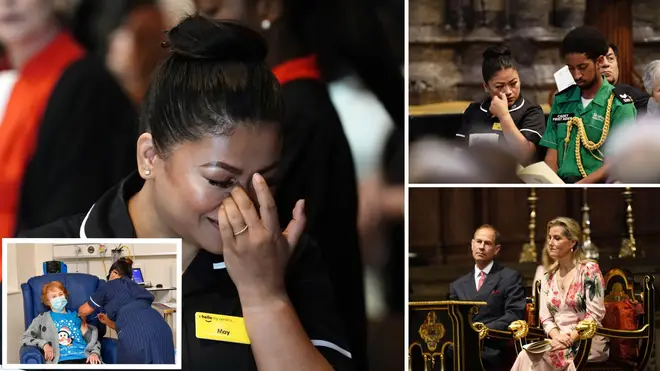
The nurse who administered the historic first ever Covid-19 jab in the UK was overcome with emotion during a service honouring 75 years of the NHS today.
Nurse May Parsons made history and become the face of the COVID-19 vaccine campaign after she became the first person in the world to deliver the COVID-19 vaccine to a patient outside of a clinical trial.
She gave the first dose of the Pfizer/BioNTech vaccine to Margaret Keenan at University Hospital, Coventry, on 8 December, 2020.
Nurse Parsons told LBC today: “All of my colleagues will be reflecting on the greatness of the 75 years of the NHS… particularly in the last 3 years during the pandemic. "
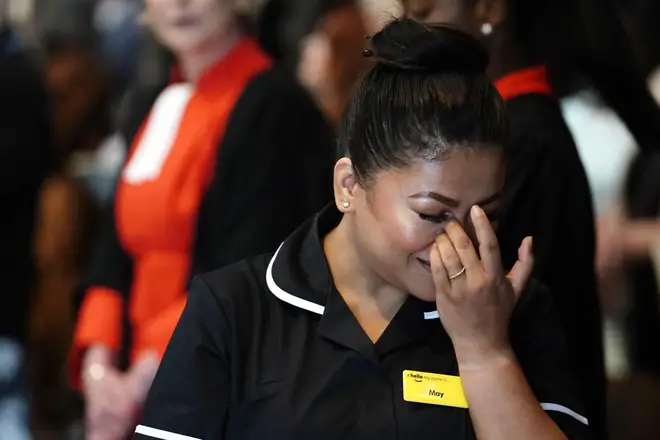
She said she experienced “fear and confusion” during the pandemic but that she wanted to use her skills to the fullest to help people in their time of need.
“I was really scared to death. This was a gamble, no-one knew anything about it.”

Nick Ferrari speaks to nurse who delivered the first Covid vaccination
But she revealed she has never had Covid.
On giving the first ever Covid-19 jab, she said: “I was nervous for her [Margaret Keenan]."
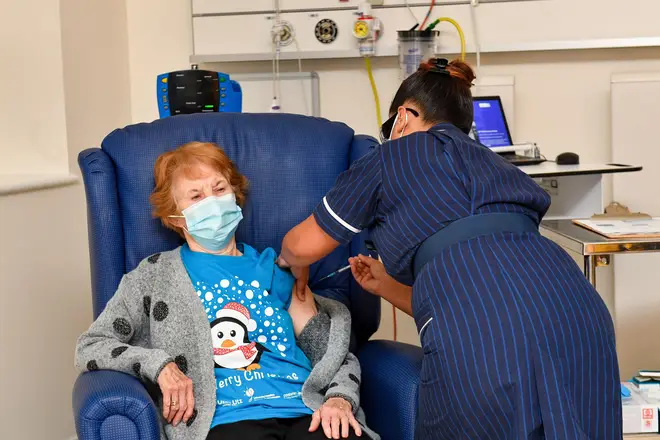
Politicians, royals, doctors and nurses were among those at the special service at Westminster Abbey today marking 75 years of the NHS.
Amanda Pritchard, chief executive of the NHS in England, paid tribute to the "constant" compassion of the service's 1.4 million staff but acknowledged the "enormous challenges" faced by workers, including the record demand for services and the backlog of care.
She said: "The history of the NHS is one of change and innovation, so while striving to meet the needs of today's patients, we are also making decisions to ensure we adapt to meet the needs of the next generation.
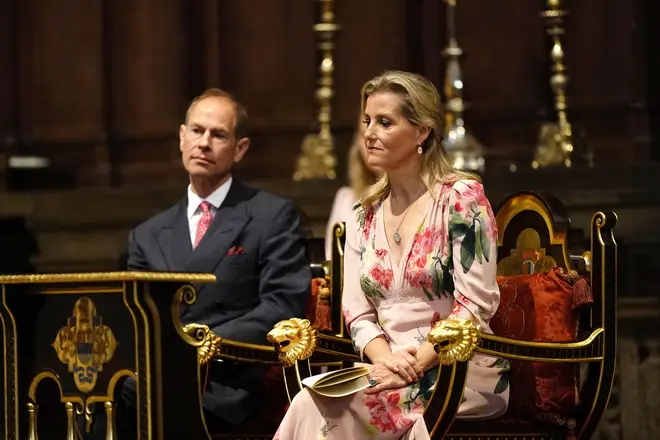
"From creating and expanding new services such as our gambling clinics to treating over 100,000 people at home in virtual wards last year, the NHS is always adapting and innovating.
"While many things have changed over the last 75 years, the skill and compassion of NHS staff who care for our patients and their families has always remained constant.
Read more: Morale in the NHS is at an all-time low says NHS hospital boss, as it turns 75

The NHS’s milestones in healthcare as service turns 75
"They face enormous challenges: recovering services, addressing Covid backlogs that inevitably built up over the pandemic and dealing with record demand for services."
In honour of its 75th anniversary, the National Health Service (NHS) held a special ceremony at Westminster Abbey in London. The event honoured NHS staff and patients who have contributed to its remarkable journey.
Joining the congregation of 1,500 health service staff, politicians, and NHS supporters were the Duke and Duchess of Edinburgh.
The attendees had the privilege of witnessing the NHS's George Cross, bestowed upon the health service by the late Queen, as a recognition of the exemplary work carried out during the challenging times of the Covid-19 pandemic and throughout its history.
Exclusive: NHS trusts spend 'shocking' £46m on recruitment agencies and consultants
In one of her final public engagements before her passing, the Queen presented the medal to the NHS at a ceremony held at Windsor Castle. The ceremony at Westminster Abbey will feature prominent health service leaders from across the four nations.
Amanda Pritchard, the Chief Executive of NHS England, addressed the congregation, highlighting the achievements and contributions of the NHS.
Read more: 'We desperately need it': Shadow Health Secretary reacts to the government's NHS expansion plan
Nurse Parsons was accompanied by Kyle Dean-Curtis, a 17-year-old St John Ambulance cadet of the year with aspirations of working in the NHS, and Enid Richmond, a 91-year-old who was among the first employees of the NHS, serving as a member of the junior clerical staff as part of the special service.
During the ceremony, prayers and testimonies will be shared by esteemed health leaders such as Health Secretary Steve Barclay, Dame Ruth May, the Chief Nurse of NHS England, Professor Sir Stephen Powis, the National Medical Director of NHS England, and Ellie Orton, the Chief Executive of NHS Charities Together.
Speaking to Nick Ferrari at Breakfast on LBC the Health Minister Maria Caulfield explained what the NHS means to her. The minister worked in the service as a nurse for 20 years.

Health Minister explains what the NHS means to her on the service's 75th birthday
Recognising the bravery displayed on the frontlines, individuals such as Richard Webb-Stevens, a paramedic who was first to respond during the Westminster Bridge terror attack, and Dr Martin English and Dr Michael Griksaitis, NHS consultants who led a team that brought 21 Ukrainian children with cancer to the UK following the Russian invasion, have also been invited.
Reflecting on this significant milestone, Health Secretary Steve Barclay expressed gratitude towards all past and present NHS staff, recognizing their contributions from doctors, nurses, and caregivers to the supporting staff who diligently maintain the hospitals.

He emphasized the NHS's remarkable journey, which began in the aftermath of World War II, witnessed groundbreaking achievements like the birth of the world's first test tube baby, and culminated in the administration of the first Covid vaccine. Barclay acknowledged the NHS as a national treasure deserving of recognition and appreciation.
Dame Ruth May further highlighted the NHS's accomplishments, crediting the hardworking staff and volunteers who have shaped its course over the past 75 years.
She acknowledged the resilience and adaptability demonstrated by the NHS in the face of challenges, including the recent Covid-19 pandemic, which has had a profound impact on the lives of people worldwide.
Dame Ruth expressed her delight at celebrating the NHS's 75th birthday and thanked the extraordinary staff and volunteers who have been the backbone of the health service.
The day of celebration will extend beyond Westminster Abbey, with numerous iconic buildings across the country, such as Nottingham Castle, the Houses of Parliament, the London Eye, and Liverpool's Liver Building, illuminating in the NHS's signature blue colour.
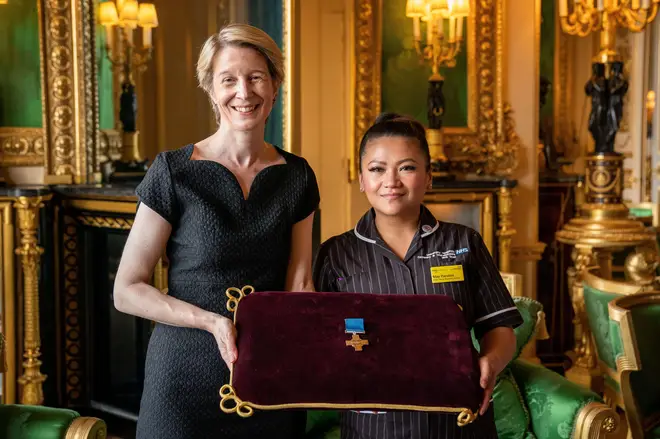
British artist Charlie Mackesy has created a special NHS75 illustration, capturing the spirit and impact of the NHS, which will be released on the anniversary. Additionally, the Royal Mint has released a collectible 50p coin commemorating the NHS's milestone.
Amidst the nationwide celebrations, Addenbrooke's Hospital in Cambridge has welcomed a new surgical robot, made possible through a successful £1.5 million fundraising campaign by Addenbrooke's Charitable Trust.
In a show of support, the King and Queen recently visited the Royal Infirmary of Edinburgh, engaging with patients and lightening the atmosphere with Camilla's jovial remark that she shares the same age as the NHS.
In Wales, Health Minister Eluned Morgan participated in the naming of a Great Western Railway train after Aneurin Bevan, the founder of the NHS, at Newport Station, paying homage to the visionary who laid the foundation for the health service.
On Wednesday, the Northern Ireland Confederation for Health and Social Care is hosting an event at Parliament Buildings, Stormont, to mark the occasion.
Even recreational activities will be dedicated to the NHS, with Park Run and Junior Park Run events across the UK over the weekend being aligned with the service's anniversary.
As the NHS celebrates its remarkable 75-year journey, the ceremony at Westminster Abbey serves as a poignant reminder of the invaluable contributions made by its staff and the indelible impact it has had on countless lives. It is an opportunity to honor the past, celebrate the present, and look ahead to the future, embracing new opportunities and innovations in the next 75 years.

A&E nurse say we can't just blame NHS crisis on politics
The world's best-known health system came into being on July 5 1948.
Maintaining its status as a leader in healthcare advances has been achieved by ground-breaking surgeries, vital clinical trials and radical reforms.
- July 5 1948: The NHS is launched by health secretary Aneurin Bevan at Park Hospital in Manchester - today known as Trafford General Hospital.
The British public become entitled to a free, comprehensive healthcare funded by general taxation.
At a minute past midnight, the first ever baby was born on the NHS at Amman Valley Hospital in Wales.
Aneira Thomas was named after the NHS's founder, Mr Bevan.
- 1952: Charging for prescriptions, dental services and spectacles began in 1952.
At the time prescription charges were one shilling; the cost of a prescription now is £9.65.
- 1958: The NHS launches a polio and diphtheria vaccinations programme.
- 1960: The first UK kidney transplant takes place at Edinburgh Royal Infirmary involving identical 49-year-old twins.
- 1961: The contraceptive pill is made available, initially only to married women.
- 1962: Health minister Enoch Powell introduces his Hospital Plan to set out a vision to build a hospital in each area where more than 125,000 people lived.
- 1968: Britain's first heart transplant is carried out at the National Heart Hospital in Marylebone, London.
- 1972: CT scans revolutionise how doctors can see the body. Computerised tomography (CT) scanners produce 3D images from a large series of 2D X-rays.
- 1978: The world's first IVF baby is born. Then known as a "test tube baby", Louise Brown was born on July 25.
- 1980s: The NHS sees vast technological improvements from the introduction of MRI scanners and keyhole surgery.
- 1986: The first Aids health campaign is launched.
- 1987: The world's first liver, heart and lung transplant is carried out at Papworth Hospital in Cambridge.
- 1988: The breast screening programme is introduced.
- 1994: The NHS Organ Donor Register is launched.
- 1998: NHS Direct is launched.
It has since been replaced by NHS 111 - the number people can call if they need help, if it is not a 999 emergency.
- 1999: Scotland, Wales and Northern Ireland are given devolved health powers.
- 2000: NHS walk-in centres are introduced.
- 2002: The first successful gene therapy is carried out at Great Ormond Street Hospital in London.
In the same year, the four-hour target for A&E departments is introduced.
This means that patients should be treated, admitted, discharged or transferred within four hours of arriving in the emergency room.
The target is still in use and seen by many as a barometer for how the health system as a whole is coping.
- 2006: The NHS Bowel Cancer Screening Programme is launched.
- 2007: Twenty-year-old David Lomas becomes the first living organ donor in the UK as he donates part of his liver to his father Stephen, 50.
- 2008: The HPV vaccination programme is launched against human papilloma virus to help prevent cervical and other types of cancer.
- 2009: The Stroke Act FAST campaign is launched. FAST stands for Face Arm Speech Time, and is a simple test to help people recognise the signs of stroke and to call 999 if it is suspected.
In the same year, the health watchdog the Care Quality Commission is launched.
- 2012: The Health and Social Care Act 2012 was first published, taking effect on April 1 2013.
Meanwhile, a surgical team at Leeds General Infirmary carries out the UK's first hand transplant operation.
- 2013: The NHS Friends and Family Test is introduced in 2013, which asks patients whether they would recommend hospital wards and A&E departments to their friends and family if they needed similar care or treatment.
Meanwhile the NHS introduces the Cancer Drugs fund to enable certain drugs to be fast-tracked for cancer patients.
- 2016: Medics at Leeds Teaching Hospital NHS Trust conduct the UK's first double hand transplant.
- 2017: NHS launches a trial for the PrEP medicine to prevent HIV infection.
- 2018: The NHS celebrates its 70th year amid an ongoing row over funding.
- 2020: The Covid-19 pandemic hits and causes widespread disruption across the NHS.
The first ever Covid-19 jab outside of a clinical trial is delivered in the health service.
In the same year, the NHS becomes the first health system in the world to commit to become carbon net zero.
- 2021: A clinical trial in the NHS discovers that a cheap steroid, dexamethasone, can reduce deaths from Covid-19.
- 2022: NHS England strikes a deal for the world's most expensive drug with a price tag of £2.8 million that can offer babies and young children with metachromatic leukodystrophy the prospect of a normal life.
Also in 2022, the NHS conducts the first net zero operation at Solihull Hospital.
Meanwhile, the NHS is awarded the George Cross for the work staff performed during the Covid-19 pandemic and throughout its history.
Later that year, the first wave of mass walkouts by various staff groups begins in the bitter dispute over pay.
- 2023: The first ever Long Term NHS Workforce plan for England is launched.